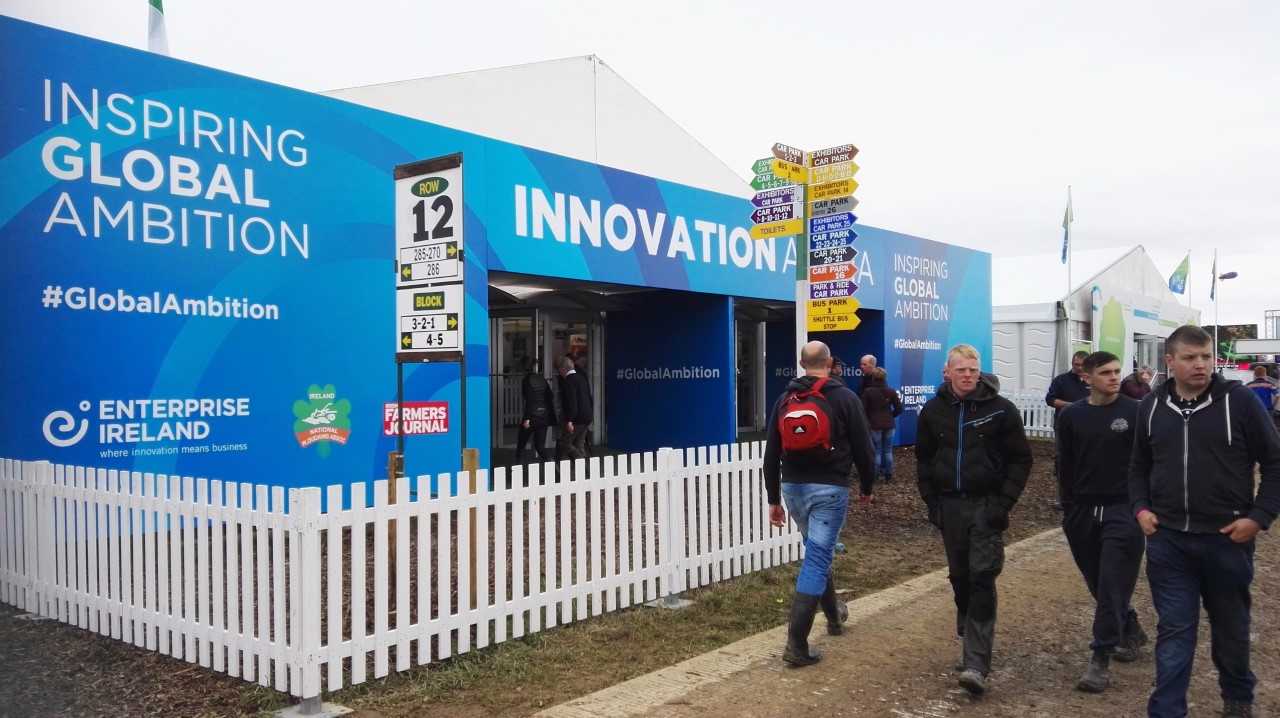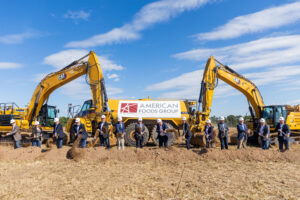Enterprise Ireland (EI) is a government-funded organization within Ireland and with 33 offices around the world, encouraging the global growth of Irish businesses through some funding, advice and research. At this year’s Ireland National Ploughing Championships, the organization hosted a showcase of very early stage ag technology startups to show the hundreds of thousands of attendees at the three-day event.
We spoke to Alan Hobbs, manager for high-potential startups at EI, in the Innovation Arena at the Irish National Ploughing Championships in Screggan, Ireland to find out how EI works to commercialize Irish agrifood technology.
What is the relationship between Enterprise Ireland and the new fund launched by the Irish government and Finistere Ventures?

We’re actually a limited partner in their fund, through the Ireland Strategic Investment Fund (ISIF). So they’re coming here with a fund partly supported by the Irish State and they are working very closely with us on deal flow. The reality is that anyone coming to Ireland looking for new business, that starts with seed capital, will typically come to Enterprise Ireland.
We do about 100 “high potential startup” deals per year where we take a stake in turn for our investments. We go in with a vehicle called CCRPs, convertible cumulative preference shares, which go into the company at the outset as a seed investment and they don’t transfer into equity until an external body puts a value on the company or they take an external investment. So we’re able to fund them at the very start and that’s the most difficult time for any startup to get funding.
What is your average investment size?
For the past 15 years, the average investment size would be in the order of €200-350,000 in investment. And then we have a second fund called the Competitive Start Fund, and that is a Y Combinator sort of scenario where you fail fast, fail cheap. We do eight a year and we have competitive calls each year for all sectors and all geographies. Other times it is for female entrepreneurship or agritech or for a particular geography. Typically in those calls we receive about 100 applications. We then narrow that down to about 30 and those companies make a video pitch. We then select maximum 15 and we’ll give them €50,000 investment and we take 10% equity. That’s for people with just an idea. It’s very, very early stage.
Are you purposefully looking to fund projects that support agricultural goals within Ireland like increasing the dairy herd?
A good example of tying into the overall state policy around industrial development would be the abolition of the EU quotas, which meant that a lot of dairy farmers were increasing their herds and increasing the output. There is a lot of demand for infrastructure for the farm, for machinery, so we have had competitive start funds solely for agritech technologies the last two years and that’ll be an annual feature for us because Ireland’s biggest industry is food. So there are a lot of nascent entrepreneurs out there in the farming industry.
All farmers are entrepreneurs and a lot of them have good ideas, but they tend to hold those ideas for use on their own farm. Some of them have evolved into large multinational players, like Keenan, McHale, CombiLift and others, but a lot of them are not getting out there, so that is why we have the innovation tent here [at the National Ploughing Championships] to try and encourage more investment from the agri community.
It sounds like you’re looking to fund companies with global plans. Since so many of your startups start on working farms, is global ambition something you have to teach?
Our focus is on people with global ambitions because Ireland is too small to build a scalable business. I wouldn’t say that most of our agritech entrepreneurs are farmers, but a lot of them have farming in their DNA. A lot of them have gone to agricultural college and they’ve chosen different career paths. A lot of them have been raised in farming families and they can see the kinds of products and services that would help create efficiencies on their own farms and thereby be able to transfer to all farming communities. The idea behind the state initiative is that with limited resources, we have to focus on the companies that are going to be focused on getting off of the island in terms of sales and having innovation at the core of their DNA. We also have the local enterprise office network and that’s there to help the smaller companies that are domestically focused.
How is the mid-stage and late-stage funding ecosystem in Ireland?
Depending on sectors, we have a phenomenal amount of venture capital being invested beyond seeds. Enterprise Ireland plays in the seed space, but we have a number of venture growth funds in Ireland from overseas and within Ireland, for example, Atlantic Bridge, and Cardinal Carlyle. There are a whole plethora of US, European and Asian funds with operations here in Ireland.
Finistere has just come and we have two more from the US that haven’t established an Irish office yet but have taken equity positions in key Irish startups in the agritech space. So we’re hoping that having these key investments in Ireland will result in them looking at us a little closer.
Photo: Enterprise Ireland





